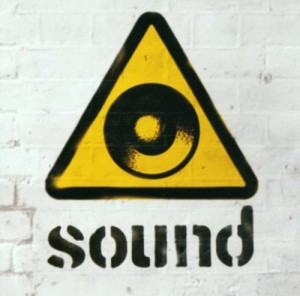In 1995 Dreadzone released an undisputed classic, a mind-melting amalgam of reggae, dub, trip hop ambient and house that seemingly distilled all of the positive elements of rave culture into one headlong rush that had absolutely none of the ecstasy fuelled darkness that came to be associated with that movement in its later years. The album, ‘second light’ remains a firm favourite today and it is impossible to play it without immediately hearing the sublime positivity and mischievous sense of musical adventure that made the album one of John Peel’s favourite albums of all time. There was, however, one element that was arguably missing from the Dreadzone of 1995 – the hyperactive personality that is MC Spee, and it was this crucial ingredient that was added to the Dreadzone line up for 2001’s underrated ‘Sound’ album. Boasting just two singles – ‘Crazy Knowledge’ and ‘believing in it’ (both of which feature in their original versions and as remixes for this expanded reissue), ‘Sound’ may not boast as many immediately accessible tunes as ‘second light’ but it does flow together wonderfully, taking the listener on a voyage through the myriad influences that make up the band. The result is a lengthy album (it fills the CD to capacity) that never dims in its appeal, a helter-skelter ride that recalls a time when bands seemed fully capable of crossing genre lines at will and where the future seemed to belong to the brightly coloured masses that flocked to Glastonbury before it became a haven for mobile-phone touting stockbrokers to look askance at the likes of Metallica and Kanye West.
Opening with ‘return of the dread’, a near perfect statement of intent with its blissed out dub, echoing layers of synth and ambiguous whistling all set to am instantly danceable beat, Dreadzone set the tone for the album and, as ‘crazy knowledge’ emerges in a haze of Pink Floyd-esque synth and samples (think ‘on the run’) we realise that we’re into one of Dreadzone’s most perfectly conceived albums yet, as sampled guitar comes up against the nagging tag line “get ready for a brainstorm!” in a manner that is reminiscent of ‘experience’-era Prodigy. ‘Mean old world’ sees Dreadzone operating in a similar field to that of Leftfield’s ‘final hit’, all squelchy synth overlaid with a rich dub tapestry that only Dreadzone and the Orb seem capable of fully incorporating without sounding incongruous. It’s a blissful sound the band produce and it should be no surprise that Dreadzone remain my go-to band when my day’s in need of brightening. Hitting new heights, ‘black rock and roll’ is Dreadzone at their most forthright, with taut guitars rubbing up against a surprisingly vigorous beat, a trick the band later repeated to great effect with ‘beyond a rock’.
The album retains its hard edge with the simmering ‘straight to a soundboy’, a track that offers up skittering beats that are as tough as anything Dreadzone have ever served up only for the cracking ambient intro of ‘digital mastermind’ to suddenly give way to a beat that out fatboys Fatboy Slim with its skanking rhythms and surf-friendly guitars. It’s a Dreadzone classic and whilst it may not have made the cut as a single, whoever compiled the ‘best of…’ album, ‘the good, the bad and the dread’ knew what they were doing when they included this brilliant track. As the title might imply, ‘Different planets’ is a spacey track riddled with acid synths and thunderous percussion that falls somewhere between ambient house and Holst and the result is no less magnificent than the wide frames of reference suggest. Sticking with the spacey theme, ‘Dread’Pon sound’ opens to the sound of arcing static and what sounds like a multitude of clocks ticking at different speeds and maintains this somnolent pace throughout, the track proving to be rather more relaxed in tempo and aspect than the ecstatic dance workouts that form the album’s blazing core. The second single from the album, ‘believing in it’, opens with the sampled roar of a crowd and works its way into becoming one of Dreadzone’s most effortlessly danceable numbers before the album proper ends with ‘the last dance’, a more chilled out number with ringing guitar and rippling synth, it forms a fitting close to the album and, as much as it’s good to have bonus tracks, it’s almost a shame that the remixes are tacked onto the end of the disc given how perfectly formed the album itself is.
Dreadzone are one of those rare bands that inspire love effortlessly in their followers. Neither naïve, nor afraid to sing about social issues when the need arises (as noted on ‘gangster’), Dreadzone still manage to convey an atmosphere of sublime love and harmony through their innovative mix of dub, trip hop, acid, house and ambient. With Dreadzone, there’s truly never a dull moment. As an album ‘sound’ is harder edged than the band’s other work, with the tracks that make up the album’s core standing as some of the most directly dance-orientated material the band have yet put their name to. Released in 2001 when bands like Letfield, Fatboy Slim and The Chemical Brothers still reigned supreme, Dreadzone made headway by simply ignoring prevailing trends and doing their own thing, neither sounding too distinct from their peers, nor sounding as if they had any interest in following them. It is this willful streak that makes Dreadzone such an innovative pleasure to listen to and ‘sound’ remains one of the bands most enigmatically varied releases. If you have the original then you may feel less inclined to pick it up on the strength of two remixes, but for those who missed out the first time round, this is an utterly essential addition to your collection.




